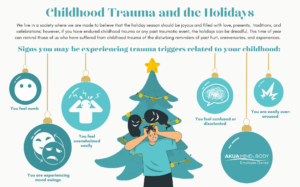Childhood Trauma and the Holidays: How Your Childhood Trauma Can Reveal Itself During the Holidays
We live in a society where we are made to believe that the holiday season should be joyous, warm, and filled with love, presents, family gatherings, delicious foods, traditions, and celebrations; however, if you have endured childhood trauma or any past traumatic event, the holidays can be dreadful. This time of year can remind those of us who have suffered from childhood trauma of the disturbing reminders of past hurt, anniversaries, and experiences.
Nostalgia can be a painful memory of what we did not get to experience as children, especially for those who endured abuse or estrangement during the holiday season and never experienced the celebration of this time of year. It is normal for you to find the holidays painful, even if you find some enjoyment in the traditions and festivities during this season. We often feel guilty for feeling triggered because we are “supposed” to feel happy. You may find yourself saying to yourself, “It’s Christmas. I should be happy”, and you don’t want to disappoint your loved ones, so you put your feelings aside, bury your triggers, and put on a happy face to get through this difficult time.
It’s important for your healing process to understand why the holiday season is triggering for you and to adopt healthy ways to cope with these feelings.
Your childhood trauma is stored inside your brain and body
You may ask yourself, “My trauma happened in my childhood; shouldn’t I be over it by now?” The answer is “not exactly”. Your brain is programmed to react to current events based on your past experiences and events, so if you experienced abuse during the holidays as a child, you form associations as an adult with holidays. For example, you may be triggered by holiday music or seeing decorations in a store. Trauma is stored inside your body and brain, and if you haven’t worked through this trauma or found ways to cope with it, you can be triggered when you least expect it. For others, some of these triggers may never entirely go away, but with therapy and healthy coping skills, you can learn to work through these painful memories that unfold during this time of year.
“Early trauma in childhood changes the developing brain because an environment characterized by abuse and neglect, for example, causes different adaptations of brain circuitry than an environment of safety, security, and love, and the earlier the distress, on average, the more profound the effects in adulthood. Whether the trauma was physical abuse, emotional abuse such as neglect, or verbal abuse, the long-term effects of childhood trauma, especially if left untreated, can wreak havoc in adulthood”.
To read more about how your childhood trauma affects your adult life, click here:

Signs you may be experiencing trauma triggers related to your childhood:
- You feel overwhelmed easily
- You feel confused or disoriented
- You are experiencing mood swings
- You feel numb
- You are easily over-aroused
f you are experiencing any of these signs or are struggling with how to cope during this holiday season because of your childhood trauma, there is hope. Seeking therapy with a mental health professional can help you healthily process your trauma and allow you to learn and adopt healthy coping mechanisms to navigate the holiday season. Unresolved trauma can lead to unhealthy behaviors such as aggression and substance misuse around this time of year.
Healthy coping mechanisms can involve the following:
- Setting boundaries: This includes turning off the holiday music if it triggers painful memories, not attending dinners if you feel uncomfortable, or not inviting certain family members to Christmas dinner if they played a part in your trauma. Your therapist can work with you to set healthy boundaries for this time of year.
- Focus on something to look forward to: This may be a vacation or a fun outing with friends after the holiday season. If you do not have anything planned in the near future, this is the time to plan something that brings you joy. This means volunteering at an animal shelter during the holidays or leaving the country for a week so you do not have to be triggered by celebrations.
- Rely on your support system: Talk to loved ones in your life who can help you deal with strong emotions related to your trauma triggers. This may be friends, family, or fellow trauma victims in your support group. Share how you are feeling and reach out before and after you attend a holiday gathering to talk about your experience. Even if you choose to be alone during the holidays, you should communicate with a trusted friend who understands and validates your mental and physical well-being.
You may sit next to your abuser at Christmas dinner
Abuse within a family system may be kept secret, and as a result, most of the year, these individuals may be estranged from their families. Still, there is often an expectation that you should put these feelings aside and reunite with your family during the holiday season, even if this means sitting next to your abuser.
Whether you endured childhood trauma in the form of physical, mental, or emotional abuse from your primary caretaker or a distant relative, you still may feel forced to spend time with your abuser at Christmas dinner. You may be surrounded by family members who refuse to believe this abuse occurred in your childhood and be expected to put on a smile and pretend everything is okay when, on the inside, you are tormented by painful feelings. You may even feel tempted to kindle a relationship with an abusive family member because you are lonely or are experiencing feelings of guilt because you left your toxic family. Your abuser may be more prone to lash out during this time of year due to excessive drinking and heightened emotions, which can put you in an unsafe environment.
Even if you have managed to learn how to dissociate successfully from the painful memories associated with your childhood trauma, it may be impossible to continue to dissociate during this time of year.
If you are in the presence of an abusive family member, you have choices. You can leave the setting immediately (even if this means stepping outside or going into another room if you do not have transportation to go elsewhere) with or without an explanation, you can contact someone in your support system who can listen to you, and you can vow to never be in a setting with this person again. Seeking therapy for childhood trauma is often a long journey that may continue throughout your adult life. Sometimes, we need to rely on a therapist to help us navigate difficult situations such as these and to help us set boundaries to protect ourselves against our abusers.
Call us: (888) 629-6707 anytime to speak with an admissions counselor, we are available 24/7.




